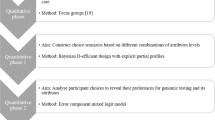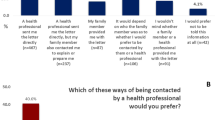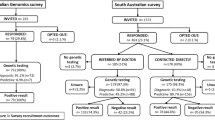Abstract
Contrasting opinions exist regarding the disclosure of incidental findings detected through clinical genomic testing. This study used a discrete choice experiment to investigate genetic health professionals’ preferences for the disclosure of incidental findings in an Australian paediatric setting. Four attributes of conditions relating to incidental findings were investigated: availability of prevention and treatment, chance of symptoms ever developing, age of onset and severity. Questionnaires from 59 Australian genetic health professionals were analysed. Results show that when evaluating incidental findings for disclosure, these professionals value the availability of prevention and treatment for the condition above all other characteristics included in the study. The framework of this discrete choice experiment can be used to investigate the preferences of other stakeholders such as paediatricians and parents about disclosure of incidental findings. The results of this study may be considered when assessing which categories of incidental findings are most suitable for disclosure in clinical practice.
Similar content being viewed by others
Log in or create a free account to read this content
Gain free access to this article, as well as selected content from this journal and more on nature.com
or
References
Sagoo GS, Butterworth AS, Sanderson S, Shaw-Smith C, Higgins JPT, Burton H : Array CGH in patients with learning disability (mental retardation) and congenital anomalies: updated systematic review and meta-analysis of 19 studies and 13,926 subjects. Genet Med 2009; 11: 139–146.
Green RC, Berg JS, Grody WW et al: ACMG recommendations for reporting of incidental findings in clinical exome and genome sequencing. Genet Med 2013; 15: 565–574.
Jackson L, Goldsmith L, O'Connor A, Skirton H : Incidental findings in genetic research and clinical diagnostic tests: a systematic review. Am J Med Genet 2012; 158: 3159–3167.
Rigter T, Henneman L, Kristoffersson U et al: Reflecting on earlier experiences with unsolicited findings: Points to consider for next generation sequencing and informed consent in diagnostics. Hum Mutat 2013; 34: 1322–1328.
Berg JS, Khoury MJ, Evans JP : Deploying whole genome sequencing in clinical practice and public health: meeting the challenge one bin at a time. Genet Med 2011; 13: 499–504.
McGuire AL, Joffe S, Koenig BA et al: Ethics and genomic incidental findings. Science 2013; 340: 1047–1048.
Lancsar E, Louviere J : Conducting discrete choice experiments to inform healthcare decision making: a user's guide. PharmacoEconomics 2008; 26: 661–677.
Ryan M, Scott DA, Reeves C et al: Eliciting public preferences for healthcare: a systematic review of techniques. Health Technol Assess 2001; 5: 1–186.
Turbitt E, Halliday JL, Metcalfe SA : Key informants’ perspectives of implementing chromosomal microarrays into clinical practice in Australia. Twin Res Hum Genet 2013; 16: 833–839.
Hahn G, Shaprio S : A Catalogue and Computer Program for the Design and Analysis of Orthoganol Symmetric and Asymmetric Fractional Factorial Experiments. General Electric Research and Development Center. Schenectady: New York, NY, USA, 1966.
Ryan M, Gerard K, Amaya-Amaya M (eds): Using discrete choice experiments to value health and health care; in The Economics of Non-Market Goods and Resources, vol 11 Springer: Dordrecht, The Netherlands, 2008.
Bennette CS, Trinidad SB, Fullerton SM et al: Return of incidental findings in genomic medicine: measuring what patients value – development of an instrument to measure preferences for information from next-generation testing (IMPRINT). Genet Med 2013; 15: 873–881.
Van El CG, Cornel MC, Borry P et al: Whole-genome sequencing in health care. Eur J Hum Genet 2013; 21: S1–S5.
Burke W, Antommaria AHM, Bennett R et al: Recommendations for returning genomic incidental findings? We need to talk!. Genet Med 2013; 15: 854–859.
Kemper AR, Green NS, Calonge N et al: Decision-making process for conditions nominated to the Recommended Uniform Screening Panel: statement of the US Department of Health and Human Services Secretary's Advisory Committee on Heritable Disorders in Newborns and Children. Genet Med 2013, e-pub ahead of print 1 August 2013 doi:10.1038/gim.2013.98.
Cornel MC, Rigter T, Weinreich SS et al: A framework to start the debate on neonatal screening policies in the EU: an Expert Opinion Document. Eur J Hum Genet 2013; 22: 12–17.
Grove ME, Wolpert MN, Cho MK, Lee SS-J, Ormond KE : Views of Genetics Health Professionals on the Return of Genomic Results. J Genet Couns 2013, e-pub ahead of print 2 June 2013 doi:10.1007/s10897-1013.
Townsend A, Adam S, Birch PH, Lohn Z, Rousseau F, Friedman JM : ‘I want to know what's in Pandora's box’: comparing stakeholder perspectives on incidental findings in clinical whole genomic sequencing. Am J Med Genet 2012; 158A: 2519–2525.
Pencarinha DF, Bell NK, Edwards JG, Best RG : Ethical issues in genetic counseling: a comparison of MS counselor and medical geneticist perspectives. J Genet Couns 1992; 1: 19–30.
Sahhar MA, Young M-A, Sheffield LJ, Aitken M : Educating genetic counselors in Australia: developing an international perspective. J Genet Couns 2005; 14: 283–294.
Alliman S, Veach PM, Bartels DM, Lian F, James C, LeRoy BS : A comparative analysis of ethical and professional challenges experienced by Australian and US genetic counselors. J Genet Couns 2009; 18: 379–394.
Acknowledgements
We thank the respondents in this study for their time and sharing their experiences and opinions. We thank Dr Melissa Hill for her input into the study design. This work was supported by the Victorian Government’s Operational Infrastructure Support Program.
Author information
Authors and Affiliations
Corresponding author
Ethics declarations
Competing interests
The authors declare no conflict of interest.
Additional information
Supplementary Information accompanies this paper on European Journal of Human Genetics website
Supplementary information
Rights and permissions
About this article
Cite this article
Turbitt, E., Wiest, M., Halliday, J. et al. Availability of treatment drives decisions of genetic health professionals about disclosure of incidental findings. Eur J Hum Genet 22, 1225–1228 (2014). https://doi.org/10.1038/ejhg.2014.11
Received:
Revised:
Accepted:
Published:
Issue date:
DOI: https://doi.org/10.1038/ejhg.2014.11



